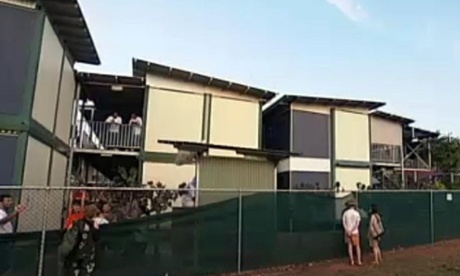Haidar Ali Ikhtiyar died in detention in Darwin two weeks after a Serco officer reported he had asked other detainees how to take his life, inquest told

An Afghan asylum seeker who died in a Darwin detention centre asked other detainees how to take his life two weeks before his death, an inquest heard, but the information was not passed on to medical staff treating him.
The inquest, held last month, heard Haidar Ali Ikhtiyar, 62, did not talk to others in detention about self-harming, saying “suicide was against his religion and that he would not engage in it for fear of causing his family severe embarrassment”, coroner Greg Cavanagh said.
But two weeks before Ikhtiyar died, Serco client service officer Mehdi Jafari reported that Ikhtiyar had asked other detainees how to take his life.
Handing down his findings on Monday, Cavanagh said it was of “serious concern” that the report did not end up in the hands of the clinicians. “There appears to be no explanation as to why it did not,” Cavanagh said.
But he found this played no part in Ikhtiyar’s death.
Ikhtiyar died at Wickham Point detention centre on 15 June last year.
Processing at Christmas Island revealed the man had a long mental health history that included depression, anxiety and post-traumatic stress disorder.
A Hazara and Shia Muslim, Ikhtiyar left Afghanistan due to problems with the Taliban, and on 19 March last year, after travelling from Pakistan to Jakarta, he boarded a boat with about 100 other people bound for Australia.
During the trip, the engines failed during storms and the boat drifted helplessly until the Australian navy rescued it, the coroner said.
Ikhtiyar was the first Hazara and the first Muslim to take their own life in an Australian detention centre.
Psychiatrist Peter Young told the inquest that Ikhtiyar “received appropriate care to a standard greater than would a person in the Australian community who exhibited the same type and degree of symptoms”.
Psychologist Jagjit Ahuja “went out of his way” to ensure that Ikhtiyar attended appointments and received his medication, Cavanagh found, but was bothered by the lack of communication between the centre’s administration and treating medical personnel.
Cavanagh found that Serco staff could not have stopped Ikhtiyar taking his own life, that they did all they could to revive him when he was found, and that standard operating procedures were appropriate.
But he recommended that the Department of Immigration and Citizenship, Serco and International Health and Medical Services examine the evidence of Ahuja and Jafari to ensure that relevant information be made available to treating clinicians of detainees in detention centres.
